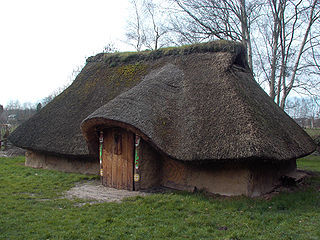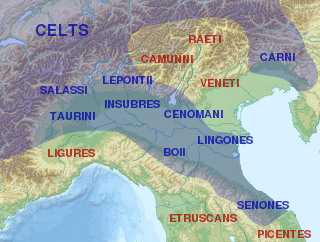
Gaul was a region of Western Europe first clearly described by the Romans, encompassing present-day France, Belgium, Luxembourg, and parts of Switzerland, the Netherlands, Germany, and Northern Italy. It covered an area of 494,000 km2 (191,000 sq mi). According to Julius Caesar, who took control of the region on behalf of the Roman Republic, Gaul was divided into three parts: Gallia Celtica, Belgica, and Aquitania.

Gallia Lugdunensis was a province of the Roman Empire in what is now the modern country of France, part of the Celtic territory of Gaul formerly known as Celtica. It is named after its capital Lugdunum, possibly Roman Europe's major city west of Italy, and a major imperial mint. Outside Lugdunum was the Sanctuary of the Three Gauls, where representatives met to celebrate the cult of Rome and Augustus.

The Nervii were one of the most powerful Belgic tribes of northern Gaul at the time of its conquest by Rome. Their territory corresponds to the central part of modern Belgium, including Brussels, and stretched southwards into French Hainault. During their first century BC Roman military campaign, Julius Caesar's contacts among the Remi stated that the Nervii were the most warlike of the Belgae. In times of war, they were known to trek long distances to take part in battles. Being one of the northerly Belgic tribes, with the Menapii to the west, and the Eburones to their east, they were considered by Caesar to be relatively uncorrupted by civilization. According to Tacitus they claimed Germanic descent. According to Strabo they were of Germanic origin.

Gallia Aquitania, also known as Aquitaine or Aquitaine Gaul, was a province of the Roman Empire. It lies in present-day southwest France, where it gives its name to the modern region of Aquitaine. It was bordered by the provinces of Gallia Lugdunensis, Gallia Narbonensis, and Hispania Tarraconensis.

The Belgae were a large confederation of tribes living in northern Gaul, between the English Channel, the west bank of the Rhine, and the northern bank of the river Seine, from at least the third century BC. They were discussed in depth by Julius Caesar in his account of his wars in Gaul. Some peoples in southern Britain were also called Belgae and had apparently moved from the continent. T. F. O'Rahilly believed that some had moved further west and he equated them with the Fir Bolg in Ireland. The Roman province of Gallia Belgica was named after the continental Belgae. The term continued to be used in the region until the present day and is reflected in the name of the modern country of Belgium.

Gallia Belgica was a province of the Roman Empire located in the north-eastern part of Roman Gaul, in what is today primarily northern France, Belgium, and Luxembourg, along with parts of the Netherlands and Germany.

The Menapii were a Belgic tribe dwelling near the North Sea, around present-day Cassel, during the Iron Age and the Roman period.

The Lingones were a Gallic tribe of the Iron Age and Roman periods. They dwelled in the region surrounding the present-day city of Langres, between the provinces of Gallia Lugdunensis and Gallia Belgica.

The Suessiones were a Belgic tribe, dwelling in the modern Aisne and Oise regions during the La Tène and Roman periods.

The Morini were a Belgic coastal tribe dwelling in the modern Pas de Calais region, around present-day Boulogne-sur-Mer, during the Iron Age and the Roman period.

The Aquitani were a tribe that lived in the region between the Pyrenees, the Atlantic Ocean, and the Garonne, in present-day southwestern France in the 1st century BCE. The Romans dubbed this region Gallia Aquitania. Classical authors such as Julius Caesar and Strabo clearly distinguish the Aquitani from the other peoples of Gaul, and note their similarity to others in the Iberian Peninsula.

The Sequani were a Gallic tribe dwelling in the upper river basin of the Arar river (Saône), the valley of the Doubs and the Jura Mountains during the Iron Age and the Roman period.

Roman Gaul refers to Gaul under provincial rule in the Roman Empire from the 1st century BC to the 5th century AD.

The Pictones were a Gallic tribe dwelling south of the Loire river, in the modern departments of Vendée, Deux-Sèvres and Vienne, during the Iron Age and Roman period.

The Parisii were a Gallic tribe that dwelt on the banks of the river Seine during the Iron Age and the Roman era. They lived on lands now occupied by the modern city of Paris, whose name is derived from the ethnonym.
The Caletes or Caleti were a Belgic or Gallic tribe dwelling in Pays de Caux, in present-day Normandy, during the Iron Age and the Roman period.
The various names used since classical times for the people known today as the Celts are of disparate origins.

The Gauls were a group of Celtic peoples of mainland Europe in the Iron Age and the Roman period. Their homeland was known as Gaul (Gallia). They spoke Gaulish, a continental Celtic language.

Over the course of nearly four centuries, the Roman Republic fought a series of wars against various Celtic tribes, whom they collectively described as Galli, or Gauls. Among the principal Gallic peoples described as antagonists by Greek and Roman writers were the Senones, Insubres, Boii, and Gaesatae.














